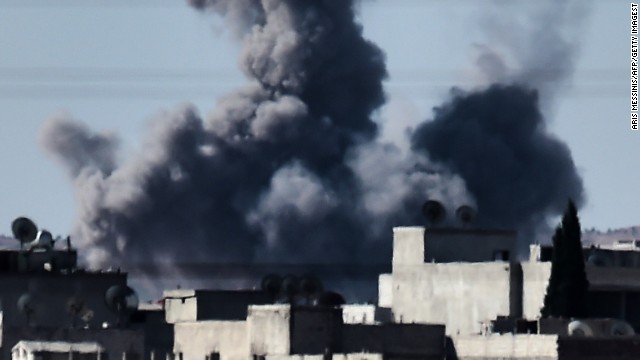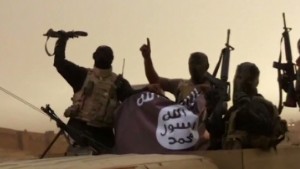Turkey says it won't launch ground action alone against ISIS
 (CNN) -- Turkey's foreign minister insisted Thursday
that it is not "realistic" for the world to expect it alone to launch a
ground operation against ISIS, even as a monitoring group said the
extremists had seized a chunk of a key battleground town near its
border.
(CNN) -- Turkey's foreign minister insisted Thursday
that it is not "realistic" for the world to expect it alone to launch a
ground operation against ISIS, even as a monitoring group said the
extremists had seized a chunk of a key battleground town near its
border.
Speaking alongside the
visiting NATO Secretary General Jens Stoltenberg, Mevlut Cavusoglu also
contended that airstrikes alone would not solve the problem, saying that
they cannot change the balance of power or "clean the whole region of
ISIS and other terrorists."
The remarks will dismay many in Turkey who have demanded military intervention in Syria.
Turkey has taken in more
than 1.5 million people from Syria and Iraq, Cavusoglu said, including
some 200,000 Syrians from the Kobani region in recent days.

ISIS threat stirs Sunni Awakening
A resolution passed the Turkish Parliament last week authorizing action against ISIS.
And ISIS is inching closer to overtaking Kobani, a Kurdish enclave in Syria that's a stone's throw from the Turkish border.
The town, also known as
Ayn al-Arab, has been the scene of intense fighting and a string of
airstrikes by the U.S.-led coalition against ISIS fighters in recent
days.
Despite the desperate
efforts of Kurdish fighters, ISIS militants have managed to wrest
control of a third of its territory, the Syrian Observatory for Human
Rights, a London-based monitoring group, said Thursday.
It said 19 ISIS militants
and 15 Kurdish fighters were killed in battles in Kobani on Wednesday,
while 23 ISIS members were killed in U.S.-led coalition air strikes.
Protesters in Turkey,
many of them Kurds, are calling on the government to take tough action
and to allow fighters to go across the border to fight ISIS.
In some cases, the protests have turned violent, leaving at least 19 demonstrators dead and 145 injured.
Pentagon: Airstrikes won't save Kobani
U.S. airstrikes "are not going to save" Kobani, said Pentagon spokesman Rear Adm. John Kirby.
"I think we all should be steeling ourselves for that eventuality," he told reporters Wednesday.
"We've been very honest
about the limits of air power here. The ground forces that matter the
most are indigenous ground forces, and we don't have a willing, capable,
effective partner on the ground inside Syria right now -- it's just a
fact."
The greater U.S. strategy, Kirby said, is to degrade ISIS' ability to sustain itself.
Several senior U.S. administration officials said Kobani will soon fall to ISIS, which calls itself the Islamic State.
They downplayed the importance of it, saying the city is not a major U.S. concern.
But a look at the city
shows why it would mark an important strategic victory for the
militants. ISIS would control a complete swath of land between its
self-declared capital of Raqqa, Syria, and Turkey -- a stretch of more
than 100 kilometers (62 miles).
The United States wants
Turkey to do more, U.S. administration officials said, and is urging
Turkey to at least fire artillery at ISIS targets across the border.
But the Turkish
reluctance, the officials say, is wrapped up in the complex relationship
with their own Kurds and the idea that they don't want to help any of
the Kurds in any way.
'No discrimination'
In his remarks,
Cavusoglu rejected the suggestion that Turkey had hung back, saying it
has "never acted reluctantly on this issue."
He also denied that any "discrimination on a sectarian basis" was in play in Turkey's decisions.
But he urged the
protesters who've clashed with Turkish security forces "to evaluate
who's actually siding with the people of Kobani."
Turkey will continue to
provide humanitarian aid, he said, but he warned that pushing for more
action "would not be a good approach."
Stoltenberg praised
Turkey for its humanitarian commitment and said NATO would stand behind
it as a member state. The alliance already has Patriot missiles
stationed on Turkey's border to protect against missile attacks.
Source: ccn.com










0 comments:
Post a Comment